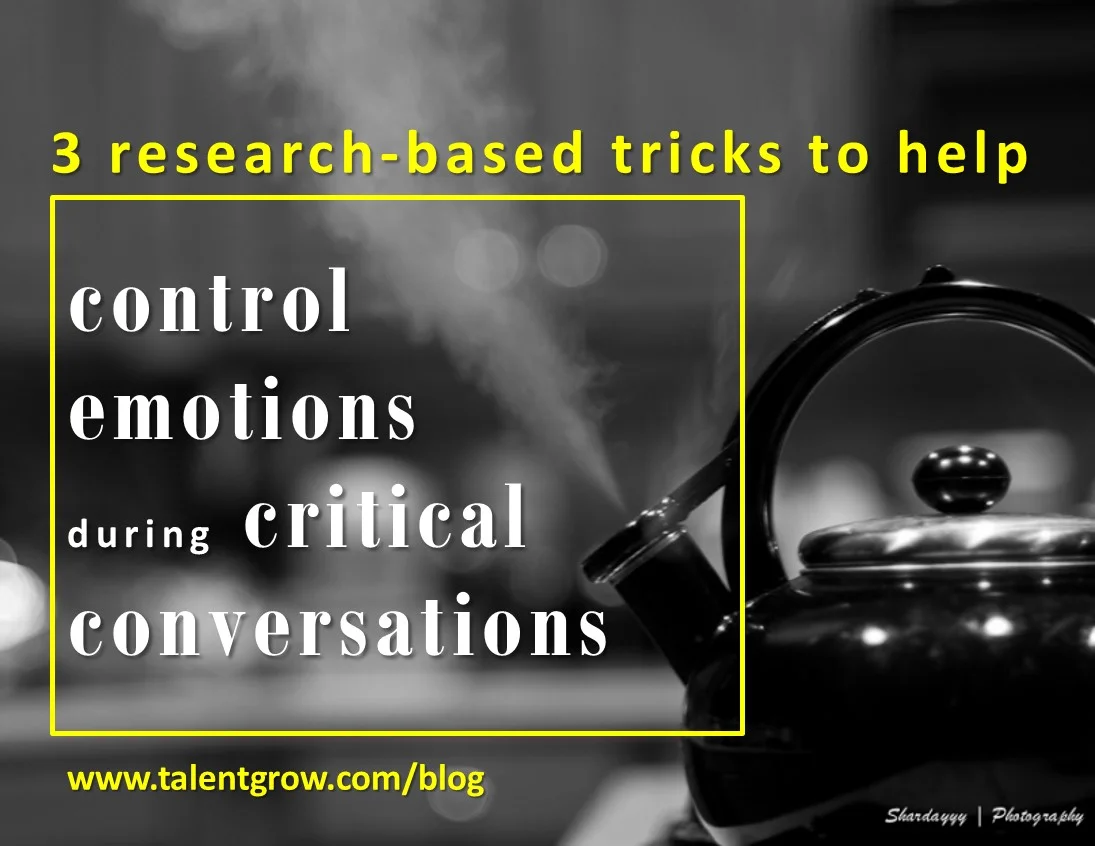3 research-based tricks to help control emotions during critical conversations
/Scene: critical conversations workshop, conference center outside of Atlanta, Georgia
Situation: For practice during this day-long interactive workshop, I asked my workshop participants, who are all young professionals in a consulting firm, to reflect on an upcoming tough conversation they need to prepare for.
Story: One of the participants, a young woman, described her upcoming critical conversation with a coworker. She and he are friends outside of work who go to the gym and even ran a 5k race together. They get along very well.
But at work, this coworker has been quite verbally abusive to her, shaming her in front of colleagues and managers and putting down her work product. He even wrote “WTF” on one of the documents that she prepared and he reviewed, which made its way into the manager’s hands and was potentially client-bound before thankfully being intercepted. She wants to ask him to stop being abusive and to make his feedback more constructive.
And… ACTION!
Whoa Nelly! You can’t make this stuff up.
How can it be that someone can get away with acting this way in a corporate environment that is very conservative, professional, and has a reputation for hiring only the brightest of talents?
Everyone in the workshop is shocked upon hearing this story, including the facilitator (that’s me). I can feel a knot in my stomach just from imagining myself in her shoes and what that must have felt like.
I guess that’s good news, the shock-factor. At least this means this is highly unusual and that we’re not sensitized to this kind of bad behavior.
Maybe your particular critical conversation doesn’t involve a conversation counterpart quite this rude, but regardless, it’s got your attention and you’re probably feeling anxiety-ridden about it. It’s got you in its grip, am I right?
So when you know that you have an upcoming challenging conversation that may lead to conflict, disappointment, and/or disagreement (initially), how do you manage your own emotions effectively to stay productive and not get caught up in the “what the FFF” emotional reaction swirl of fight, flight, or freeze?
Learn to regulate your emotions
The key to not reacting emotionally in critical conversations is to learn to regulate our emotions.
Here are three tricks from research to help us regulate our emotions during critical conversations:
Label them.
Putting our feelings into words can help reduce their intensity. The act of searching and finding the right word to identify an emotional sensation actually engages the brain’s ‘braking system’ and dampens the limbic system (the emotional reaction center of the brain).
So, as we experience a negative emotional reaction while preparing for a critical conversation, we could say the name of the feeling we’re experiencing to actually cause it to cool down.
If we experience a strong emotional reaction during the conversation, we have two options with regard to labeling: Either we could label the emotion to ourselves, internally (i.e., silently). Or, if we think it is appropriate for the context and person, we could choose to name our emotion out loud by bringing it into our conversation.
For example, we might say, “I’m feeling frustrated about the way you wrote your comments on my work papers yesterday.” We should experience a reduction in the intensity of the emotion as a result of naming it.
Reappraise them.
Reappraising our emotions means reframing them: finding a different, more positive perspective to describe the situation. Reappraisal activates the brain’s ‘braking system’ and reduces the limbic system
Bonus: studies show that reappraising can actually cause us to have more positive emotions and less negative emotions overall, and to report having a generally higher level of well-being!
A great method for reappraising our emotions, introduced by Dr. Martin Seligman (the “Father of Positive Psychology”), is the ABCDE method, described nicely here.
Be present.
I’ve written and podcasted about the growing evidence of the importance of mindfulness – being fully present in the moment.
We can take advantage of this helpful practice to reduce our emotional reaction to our own emotions during critical conversations.
We all have an internal ‘narrator’ – a part of our brain that tells us what’s happening and what it means. But we can work to ‘turn off’ this narrator and just try to be present in the moment when we experience a negative emotional reaction. We get more ‘real time’ data to help improve our ability to make good decisions. By being mindful and present, we Increase both our awareness of external and internal data (about our own mental state) – so we can make smarter choices about what actions to take and have quicker access to more or other emotional regulation techniques.
I’d love to hear what you think!
If you want to read more about this kind of work, check out this article from Dr. David Rock and colleagues, whose work I find very useful.
Sign up to my free weekly newsletter and get more actionable tips and ideas for making yourself a better leader and a more effective communicator! It’s very short and relevant with quick tips, links, and news about leadership, communication, and self-development. Sign up now!
Also, subscribe to my podcast, The TalentGrow Show, on iTunes to always be the first in the know about new episodes of The TalentGrow Show! http://apple.co/1NiWyZo
You Might Also Like These Posts:
The common mistake we make during critical conversations and how to avoid it
Intention + interest + practice = communication success
Harness the power of your emotional intelligence!


